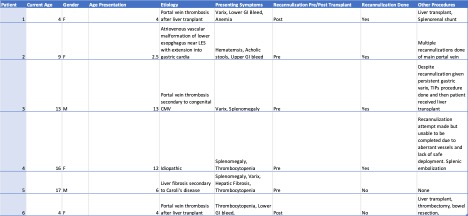Experiences in recanalization of cavernous veins in Cavernous Transformation of the Portal Vein
Natasha Dilwali1, Minna Rodrigo1, Harjit Singh2, Wikrom W Karnsakul1.
1Division of Pediatric Gastroenterology, Hepatology, and Nutrition, Johns Hopkins School of Medicine, Baltimore, MD, United States; 2Division of Interventional Radiology , Johns Hopkins School of Medicine, Baltimore, MD, United States
Introduction:
Extrahepatic portal vein obstruction is the most frequent cause of portal hypertension in children. A complication arising from this is cavernous transformation of the portal vein (CTPV). Management is complicated with two thirds of patients failing medical management. The Meso-Rex procedure restores physiologic venous flow to the liver, however due to a variety of factors (anatomy, access to care, invasive procedure) less than fifty percent of children undergo it. We demonstrate the feasibility and safety of cannulation of cavernous veins by Interventional Radiology.
Methods:
Conducted a single center, retrospective review, to analyze pediatric patients with CTPV who have undergone or are candidates for cannulation. Outcomes include etiology, portal vein patency, improvement in varices, spleen size/volume and platelet count.
Results:
We describe six patients with CTPV. All patients presented with GI bleeding prompting investigation and discovery of CTPV complications. Etiologies include portal vein thrombosis after liver transplant, idiopathic and arterio-venous malformation. Three patients had successful recanalization, one patient was unable to undergo recanalization due to aberrant vessels, and two patients are being considered for recanalization. Recanalized patients had patent portal veins on ultrasound and resolution in variceal bleeding.
Conclusion:
Management options in portal vein obstructions are complicated and require tailoring treatment to each individual. Cannulation of the portal vein or CTPV when anatomically feasible is an effective and safe alternative to restore flow, extend time to transplant and improve access to care. Follow up is needed post cannulation to ensure patency and no further interventions.

If you have any questions during the meeting, please go to the registration desk. Our emails will be monitored sporadically.
REGISTRATION DESK OPENING TIMES
Sunday, October 15, 16:00-18:00 Monday, October 16, 07:00-18:00 Tuesday October 17, 07:00-12:30